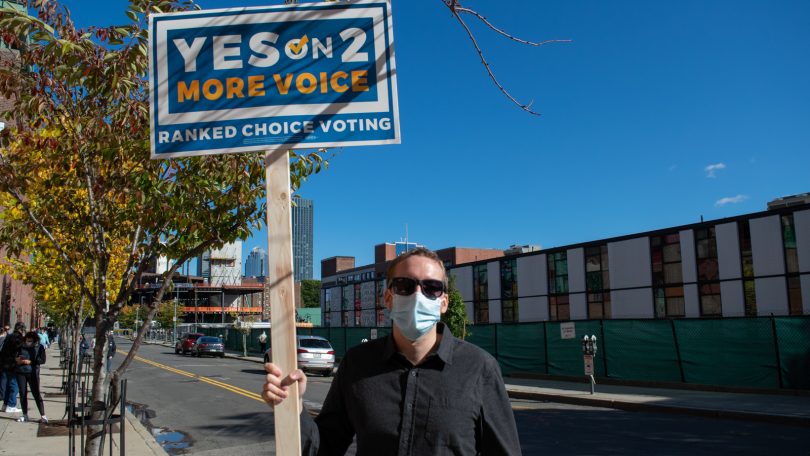By Samantha Drysdale
BU News Service
EASTON, MA – A young woman hemmed and hawed in uncertainty on her way into an Easton polling place in September to cast her vote in the Massachusetts 4th Congressional District Democratic primary. Her top choice candidate had been deemed a “spoiler.” The voter told then-candidate Jesse Mermell that she felt she had to choose between a candidate who represented her values, and one who might win.
“I can’t tell you the number of times voters would tell me, from the very beginning of the campaign to the final hours, that with such a crowded field, with so many incredibly strong, talented candidates, they were really struggling to figure out how to deploy their vote in a way that best advanced their values and their views,” said Mermell, who finished a close second in the tightly packed field.
Mermell is now working for passage of Question 2, which would implement ranked choice voting for all Massachusetts statewide offices, and federal and state legislative offices starting in 2022.
“With ranked choice voting, they wouldn’t have to play political pundit; they could just vote for the candidate they liked the best,” she said.
Advocates for the proposed law say it will update an antiquated system of plurality voting and ensure that Massachusetts’ representatives reflect the majority will of the voters. Opponents say ranked-choice voting puts an unfair burden on the voter and could create new barriers for already disenfranchised people.
The initiative would create a system where votes are counted in a series of rounds until one candidate attains a majority. Voters rank their preferences on the ballot, and if no one contender receives more than 50% in the first round, the contestant with the fewest first-place votes will be removed. Their votes will then be reallocated to those voters’ second-choice contestants. This process continues until anyone contender has over 50% of the vote.
Critics say this system could be confusing for voters, especially if they are elderly, don’t speak English as a first language or aren’t college-educated.
The reform “puts an unfair burden on the voter,” said Paul Diego Craney, spokesperson for the conservative nonprofit Massachusetts Fiscal Alliance.
That sentiment is echoed by Eitan Hersh, a political science professor at Tufts University, focusing on voting rights. He cited the 4th District Democratic primary as an example of an overcrowded election where ranked choice voting could have done more harm than good.
Hersh, who holds a Ph.D. in political science, said he could easily rank the nine candidates. But a lot of voters struggle to find even one candidate who they want to vote for.
“Suppose someone can only rank one person because that’s what has been expected in the past,” he said. “All [of a] sudden, my vote keeps getting counted no matter how many rounds of tabulations are required, and their vote gets discarded the second that the candidate they voted for is removed from the tabulations.”
Hersh said this “ballot exhaustion,” when a voter only ranked candidates who have been eliminated, could make it harder for racial minority-supported candidates to win.
“It could be that ranked choice voting produces a different candidate than our regular system here because of the ranking,” he said. “But there’s also the possibility that the reason it’s changing the election is not because of the ranking, but it is because some people, but not others, fail to fully rank their ballot. It’s most likely to help rich candidates and candidates who can spend a lot of money on politics.”
Massachusetts is not the first state to consider this reform, Maine adopted ranked choice voting in 2016, and it was first used in 2018 for state and federal elections.
Nick Murray, a policy analyst with the free-market think tank Maine Policy Institute, said research showed that on average, 10 to 11% of ballots are exhausted in these elections, in contrast to a 2 to 3% marking error, which is the standard margin of error for a regular race.
He also said lower-information voters are much less likely to participate in the system.
“We have to recognize for ranked choice voting that because it is more complex because it could result in more ballot-marking errors, it will therefore result in more votes being effectively discarded from the final tally,” he said. “So we have to ask ourselves if that is a more democratic system, is that a more responsive system to the electorate? And I would argue, no, it’s not.”
Yes On 2 backers, however, said it would promote diverse candidates by encouraging them to run without fear of splitting the vote.
Cambridge has used a similar system to elect its City Council and School Committee since 1941. According to FairVote, an organization that advocates for electoral reform, the city has consistently elected African-Americans since 1980, when the African-American population crossed 10% of the city’s total population.
Additionally, in 2008, women represented 33% of City Council membership, as opposed to 18% in Somerville or 27% in Worcester.
The statewide ballot box journey began with less than 50 volunteers crammed into a small office in Boston. Greg Dennis, policy director at the Yes On 2 campaign, said after Maine passed ranked choice voting in 2016, he and other supporters felt like it was time to start a conversation about it in Massachusetts.
Advocates have cited the 4th District primary as an example of the problems with the plurality voting system. Similarly to Mermell, Dennis said there was a lot of frustration on the part of the voters, that they needed a sense of which candidates had a chance to win to use their vote most effectively.
‘You have to weigh the odds and try to pay attention to polls, and if you’re not sure how to use your one vote, you kind of have to pick one and pray,” he said. “Then you saw the frustration on behalf of the candidates. Candidates who felt like they might be splitting the vote with other candidates in the race, some of them dropped out saying they didn’t want to be a spoiler.”
With such a crowded field, the primary winner, Newton City Councilor Jake Auchincloss, only received 22.4% of the vote. Mermell came in second with 21.1% while third-place finisher, Newton City Councilor Becky Grossman, tallied 18.1% on a progressive platform similar to Mermell.
Dennis said ranked choice voting would confront this problem. By requiring a candidate to receive 50 percent to win, “the people we are electing reflect the majority will of the voters,” he said.
Grossman, who also supports Question 2, said the ballot reform would allow citizens to vote “with their heart.” Mermell hoped the system would allow voters to have a stronger voice in elections.
“The point is making sure that voters have a voice – the greatest voice possible in the outcome,” Mermell said. “The point is making sure that voters don’t feel as if they have to choose between the lesser of two evils or worry about splitting the vote by voting for a third-party candidate or an independent candidate that might best represent their values.”
Additionally, Dennis said ranked choice voting might turn an underdog into a viable candidate, “simply because people are taking a chance on you.”
Though eliminating the spoiler effect is one of the main goals of the reform, Craney said that rather than removing this dilemma from elections, ranked choice voting just changes it.
He referenced the Maine 2nd Congressional District general election in 2018 as an example of how ranked-choice voting is “just a new voting system” which can be used to “game the system.”
The first federal election in the nation to use ranked choice ended in controversy as incumbent Republican Rep. Bruce Poliquin was unseated, despite getting the most votes on Election Day.
Poliquin amassed 46.1% of the vote – narrowly edging Democrat Jared Golden with 45.9% in the first round of counting. But since neither topped 50%, several rounds of tabulations followed. After the 8% cast for two independent candidates was redistributed, Golden won the district.
According to Craney, ranked choice voting gave the two progressive-leaning independent candidates outsized power to Golden in second and third rounds because most of their votes went to the Democrat.
Maine Policy Institute’s Murray also said the two candidates who weren’t affiliated with the two major parties affected the outcome.
“It amplifies the support of candidates who were not serious,” he said. “Voters who supported those candidates, primarily, had an outside influence in deciding the winner.”
Critics often use this election as an example of the unfairness of ranked choice. Poliquin himself sued, claiming that the system was unconstitutional, but U.S. District Judge Lance Walker rejected the lawsuit.
Advocates counter that the system worked as designed, to elect the candidate with the broadest majority of support.
“It did absolutely what it was supposed to do,” Dennis said. “What it showed was that more people supported Jared Golden over Bruce Poliquin.”
Support over Question 2 falls approximately along party lines in Massachusetts.
Eight of the nine 4th District candidates publicly supported Yes On 2, as well as U.S. Rep. Ayanna Pressley and both U.S. senators. The Massachusetts Republican State Committee unanimously opposes it.
Though the trend in Massachusetts has been Democrats in support of the referendum while Republicans are opposed, the same is not true everywhere.
California Gov. Gavin Newsom, a Democrat, vetoed a bill in October that would have allowed ranked choice voting in the state, after having years of experience with the voting system from city elections in San Francisco.
Additionally, Hazel Dukes, President of the NAACP New York State Conference, and former Democratic U.S. Sen. Mark Begich of Alaska have opposed the system.
Hersh said the support the question receives from Massachusetts liberal groups had surprised him.
“I really have a lot of trouble understanding why mainstream groups like the Massachusetts Democratic Party or the League of Women Voters or the NAACP are behind it,” he said. “On many issues, especially on ones that make voting harder and more burdensome, they tend to be very cautious.”
Dennis attributed some of the wave of support to the last presidential election, in which he said most voters felt like they weren’t voting for anybody as much as they were voting against somebody.
“It’s including more voices in the discussion and allowing people to express what they really want, not merely what they’re against,” he said. “We want voters to enter the voting booth and vote for something, not just against something.”
This article was originally published in the Hampshire Gazette.






[…] yes on ranked choice voting, ballot question number 2, would mean voters rank candidates by order of preference. It would be […]